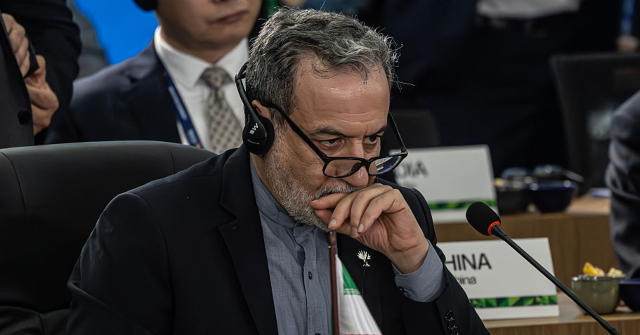Iranian Foreign Minister Abbas Araghchi suggested in a letter to senior United Nations leaders that the heads of France, Germany, and the United Kingdom “be held to account in international criminal tribunals as defendants for complicity in war crimes” for their support of Israel, Iranian media reported on Monday.
Araghchi made the outlandish suggestion as part of a larger argument that the European states should not reimpose sanctions on Tehran in response to the International Atomic Energy Agency (IAEA) finding the country in breach of its international legal obligations. IAEA chief Rafael Grossi revealed in June that the agency had evidence that Iran was running illicit uranium enrichment facilities and tried to “sanitize” them when the IAEA sent inspectors, leading to the formal rebuke from the U.N. agency.
Iran banned cooperation with the IAEA in early July following American and Israeli military activity against its illicit nuclear program.
The Iranian government has scheduled talks with the foreign ministers of Britain, France, and Germany for Friday to discuss the potential return of United Nations sanctions lifted following the 2015 Joint Comprehensive Plan of Action (JCPOA), or Iran nuclear deal. The talks this week are expected to take place in Istanbul, Turkey, and feature the deputy foreign ministers of all four countries.
The deal, brokered by former President Barack Obama, also included the three European parties, as well as China and Russia, as partners. The United States withdrew from the JCPOA in 2018 under President Donald Trump, who stated that Iran’s repeated violations of the agreement made remaining in it untenable.
Following the IAEA accusations and Iran’s repeated threats against its neighbor Israel, the three European powers, sometimes referred to in the context of the JCPOA as the “E3,” warned that they would support the “snapback” of U.N. sanctions by August 1 if Iran does not broker a new agreement under the framework of the nuclear deal by that deadline. In anticipation of the deadline, Araghchi wrote to U.N. Secretary-General Antonio Guterres and several over top U.N. officials. The letter, revealed by the Iranian state propaganda outlet PressTV on Monday, declares the E3 to have no “legal, political, or moral standing” to demand that the United Nations reimpose sanctions. Araghchi cited support from European leaders for Israel’s “Operation Rising Lion,” a military operation in response to the IAEA rebuke intended to erode Iran’s ability to attack Israel, as proof of “bad faith conduct.”
“Statements of the European Union constitute a clear manifestation of bad faith conduct aimed at depriving the Islamic Republic of Iran of its rights under the Non-Proliferation Treaty,” Araghchi wrote. “Attempting to trigger ‘snapback’ under these circumstances… constitutes an abuse of process.”
The Iranian foreign minister identified in particular a comment made by German Chancellor Friedrich Merz in June, following the launch of “Operation Rising Lion,” in which he described Israel’s attack as the “dirty work Israel is doing for all of us.”
“If anything, E3 leaders must be held to account in international criminal tribunals as defendants for complicity in war crimes,” Araghchi demanded.
The excerpts of the letter that PressTV published did not identified which criminal tribunal, but the premier platform for such trials is the International Criminal Court (ICC). The ICC only processes cases against individuals, not states, on charges of genocide, war crimes, and crimes against humanity. Should the Iranian government prefer to prosecute the European countries as state actors, the International Court of Justice (ICJ) would be the top appropriate venue.
The Iranian diplomat argued that Merz’s comment, as well as other support for Israel, meant the European countries had “relinquished their role as ‘Participants in the JCPOA,’” so they should not legally be granted the ability to request the U.N. restore sanctions.
Addressing the scheduled talks with the European JCPOA partners on Friday, Iranian Foreign Ministry spokesman Esmaeil Baghaei told reporters on Monday that Iran’s objective in those talks will not only be avoiding sanctions, but convincing the other countries to drop already existing sanctions in response to Iran’s illicit nuclear program.
“These three countries, as members of the JCPOA [The Joint Comprehensive Plan of Action] and parties that unanimously accepted Security Council Resolution 2231, had legal and moral responsibilities to condemn these aggressions; something that unfortunately was not achieved,” Baghaei said, referring to the Israeli military attacks and the supportive airstrikes on Iran by the United States.
Baghaei demanded Europe be “held accountable” for friendly relations with Washington and Jerusalem.
Iran held in-person talks with Germany, Britain, and France simultaneously most recently in late June in Geneva, Switzerland, the day before President Trump announced airstrikes to destroy the Iranian nuclear facilities at Natanz, Fordow, and Isfahan. Those talks lasted over four hours and concluded with calls for more talks, but no concrete results, and followed the original August deadline for “snapback” sanctions.
“Iran must open itself to discussion, including with the United States, to find a negotiated solution to this crisis,” French Foreign Minister Jean-Noël Barrot stated.
The American airstrikes the next day frozen the momentum to host other talks in the following weeks, prior to those scheduled for Friday.
In contrast to the aggressive condemnation of the European states in his comments on Monday, Foreign Minister spokesman Baghaei emphasized that Russia and China remain some of Iran’s closest geopolitical allies and that Tehran is striving to keep them as relevant to the possible reimposition of sanctions as possible.
“We have had good consultations with [Russia and China] over the past year,” the Foreign Ministry spokesman said. Iran sent a top adviser to “supreme leader” Ayatollah Ali Khamenei, Ali Larijani, to Moscow to meet with Russian strongman Vladimir Putin on Sunday asking for support in anticipation of potential restoration of sanctions.
Follow Frances Martel on Facebook and Twitter.
Read the full article here
